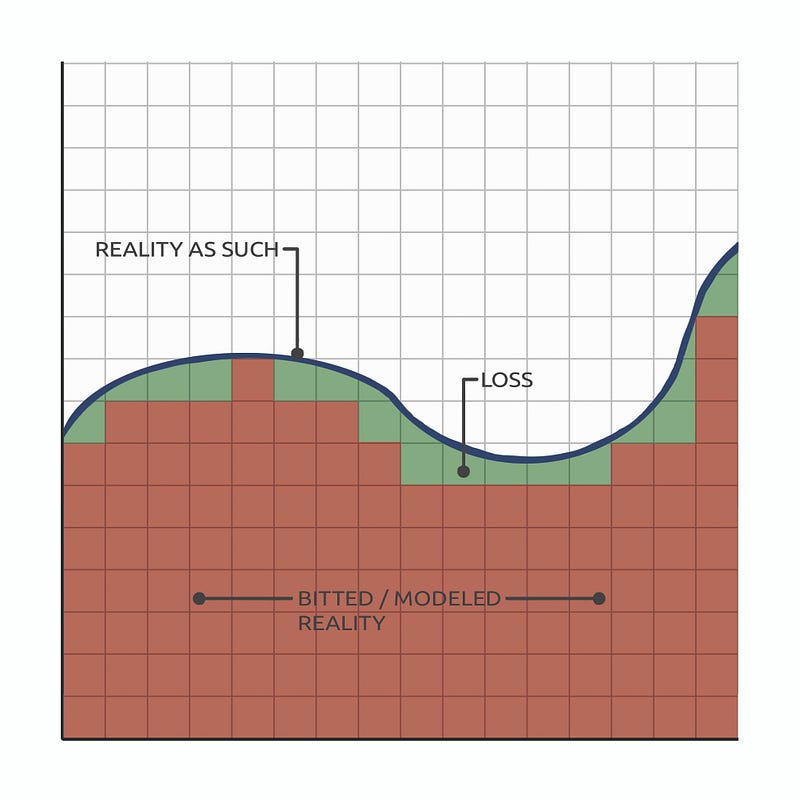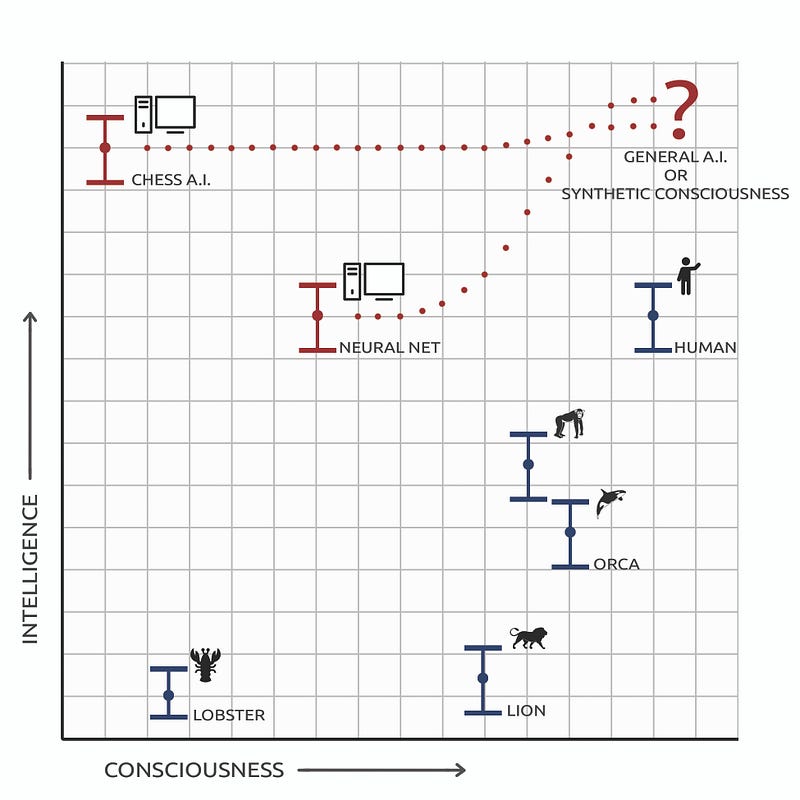
Artificial Intelligence is useful. But only in narrow domains. For example, IBM’s Watson is better at Jeopardy than any human. Yet, a simple query like, ‘Is my new outfit on fleek?’ or ‘Can an alligator run the hundred-meter hurdles?’ stumps Watson. Context, extrapolation and generalizing are difficult to compute, easier to impute, and critical to intelligence.
The foundation of intelligence is consciousness. But, we do not understand consciousness. You don’t, I don’t. It is an undeniable, emergent mystery.
This is the hard problem.
Consciousness allows for selection based on context.
What context? Well, any.
This allows one to think outside of time — beyond the present moment. Withing the abstract space of thought ideas battle. Some ideas survive, while ( most ) others die. This is fortunate for us; our ideas die, so that we do not.
Human/animal/biological perception provides a myriad of inputs from one’s immediate environment. The input is not equally weighted: placing your hand on the hot stove as a child taught you a lot. Pain is powerful feedback. For humans, this lesson generalizes beyond that one moment with that particular stove — thank you consciousness!
Language is a primary instrument in the toolkit of consciousness. Terence McKenna described language this way:
‘Language is a strategy to escape the point-like nature of the present moment. With language you can command the past and strategically anticipate the future. Geometrically extended existence.’ [1]
Together, language and consciousness are a lever that acts on space and time. Languages are freeing and constraining. For instance, one will find herself always hungry if she mistakes the menu for the dinner. But, the menu is a useful proxy that represents your plate to be. Reification is a walk on the razor’s edge; we confuse the map with the territory, the drawing with the building, the word with the actual thing.
Human language is born from human perception. Our perceptive devices trail back to the earliest form of life on earth. Emotions, attention, and more point us to what’s important, filtering out noise. Our machines are born out of our imagination. But, their language is primitive/low-resolution and disembodied when compared with our own. We apply information theory, statistics, and other fields to aid in machine perception. But these are ‘bitted’ — that is to say there is only the map, no territory.
A bit is a portmanteau of Binary Digit — the building block of computation — a single value: 0 ~or~ 1.

A popular saying in computer science is: garbage in, garbage out. Meaning a flaw upstream will cause further flaws downstream. Our machines currently suffer a similar ailment: bits in, bits out.
This list illustrates the spectrum of utilities and limitations of languages: English, Sanskrit, C, Python, Mathematics, Logic, Descriptive Geometry, Musical Notation, etc.

What we call, Artificial General Intelligence is better framed as Synthetic Consciousness. For this a different, upgraded language is due. What may it look like? How does it behave?
Proposed tenets for developing such a language:
The structure of this new grammar should resemble a bottom-up organic system — like a colony of ants. It should prefer relationships of things, to the things themselves. It must be self-correcting. Self-awareness aids self-correction. The source of correction should be direct, responsive feedback from reality. Development should take shape in a competitive evolutionary landscape, pitting iteration against iteration. Stemming from self-aware grammars will operate within their respective domains. As the languages reach their limits, a system of translation and interoperation is necessary.
Alan Watts put it this way,
‘You’re only making a mess by trying to put things straight. You’re trying to straighten out a wiggly world and no wonder you’re in trouble.’ [2]
Why straighten out wiggles, when we can start with wiggles?
_____________________________________________________
H/T — Terence McKenna, Alan Watts, Jordan Peterson, Sam Harris, Gary Marcus, Max Tegmark, Nicholas Nassim Taleb, Joe Rogan, Duncan Trussell, Yaneer Bar-Yam, Joe Norman, Wikipedia.
[1] McKenna, Terence, Global Perspectives and Psychedelic Poetics, Spoken Word, (1994; Sound Horizons Audio-Video, Inc.), Cassette.
[2] Alan Watts, A Conversation with Myself, Pilot (1971; Public Broadcasting Service), Television.
This eassy was written as a submission to CLOG X Artificial Intelligence

Leave a Reply